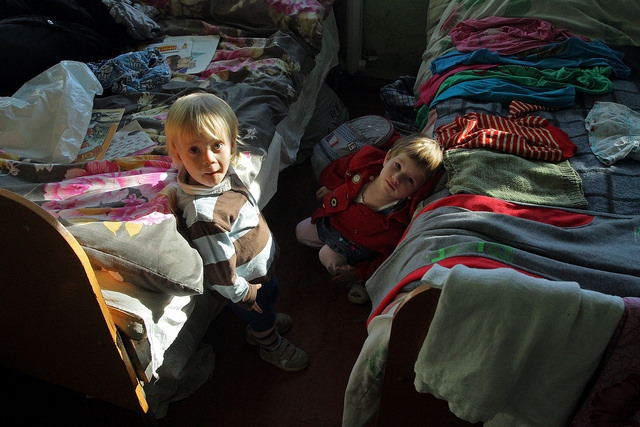
Families who had homes and jobs find themselves crammed into a small room or two and are largely dependent on charity. Credit: Caritas Ukraine
Nadiya lives alone in a the city of Kharkiv, Ukraine. It’s a place she barely knows, far from home and family. She doesn’t know whether she’ll ever see her home in Snizhne again. It is deep inside territory held by pro-separatist rebels.
Nadiya, 55, whose name means ‘hope’, is caught up in a conflict that she says she never saw coming. At least 1.5 million people in eastern Ukraine have fled their homes as a result of the armed conflict between Ukrainian government forces and separatist groups in the eastern Donbas regions.
“I didn’t take anything with me. I just left in my dress, running away in my slippers,” says Nadiya. “I didn’t even have time to think.”
Recent months have shown an alarming escalation of hostilities in the regions by pro-separatist rebels—who identify with their Russian roots and seek independence from the Ukraine—and Ukrainian forces fighting to keep the regions under government control.
The elderly and people around retirement age are particularly vulnerable in this conflict as they find themselves without a home, a pension and their families.
“I couldn’t have imagined anything like this even in my most terrible nightmare,” says Nadiya. “I had everything I needed, even my own home. But I am alive. I am standing.”
Nadiya received support from Catholic Relief Servives and Caritas to winterise her flat —with added materials around her windows and living supplies like blankets and clothing, to endure the bitter freezing temperatures. She also received a cash grant from CRS and Caritas in the amount of €264 (US$300) that she used to buy boots and a robe, and to seek dental assistance.
Nadiya still gets her pension but the cost of living in Kharkiv is much higher than in her home town. She says that she gets buy with donations from local charities but she has to pay for lots of medication for a variety of ailments.
She has a hard time talking about the reality of what it was like to live in the middle of what is essentially a war zone. She weeps when describing the sound of the shelling, the bone-chilling fear of its proximity.
“It was impossible to bear. First, the explosions were far away, but then they started coming closer. It was frightening; all I wanted was for it to be over. Now every time I hear a loud sound, even the garbage truck here, I start shivering,” she says.
Friends helped her find her new flat, but with her sister in another city and her husband dead, and just sparse belongings filling the flat, it can never really be a home.
“It just depends on your luck if you are alive or not,” she says. “I am praying to the Gods.”
